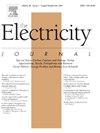Flexible operation and fugitive methane emissions limit the potential of power plant carbon capture and storage
IF 2.2
Q1 Social Sciences
引用次数: 0
Abstract
To fully decarbonize electricity generation, there is a need to meet electricity demand at times of low solar and wind availability. Natural gas combined cycle (NGCC) generation with carbon capture and storage (CCS) that reduces power plant CO2 emissions is one technology proposed for this purpose. However, CCS does not capture all power plant CO2 emissions and does not address methane emissions that occur upstream of NGCC power plants. Furthermore, the cost of CCS is often not evaluated at capacity factors that represent likely use cases of NGCC power plants in low-carbon grids. Therefore, we evaluate the effect of uncaptured fugitive methane emissions on the climate benefits of CCS and the role of NGCC capacity factors on the economics of CCS. Accounting for time- and region-dependent methane leakage, we find that CCS reduces system-level greenhouse gas emissions between 21 % and 88 %, with remaining climate impacts being primarily due to uncaptured methane emissions. At average United States methane leakage rates of 2.95 %, CCS reduces system-level greenhouse gas emissions by 47–71 %. In addition, we estimate that CCS-related capital and operating expenditures only make CCS cost-effective at high capacity factors and in the presence of financial supports such as the California cap-and-trade program and United States 45Q tax credits. These findings highlight significant technical and economic challenges of using NGCC with CCS to achieve full grid decarbonization.
灵活的操作和逸散的甲烷排放限制了发电厂碳捕获和储存的潜力
为了使发电完全脱碳,需要在太阳能和风能利用率低的时候满足电力需求。天然气联合循环(NGCC)发电与碳捕获与封存(CCS)技术可以减少发电厂的二氧化碳排放,这是为此目的提出的一项技术。然而,CCS并不能捕获所有发电厂的二氧化碳排放,也不能解决NGCC发电厂上游的甲烷排放问题。此外,CCS的成本通常没有根据容量因素进行评估,而容量因素代表了NGCC发电厂在低碳电网中的可能用例。因此,我们评估了未捕获的逸散性甲烷排放对CCS气候效益的影响,以及NGCC容量因子对CCS经济效益的影响。考虑到随时间和区域变化的甲烷泄漏,我们发现CCS减少了系统级温室气体排放21% %至88% %,其余的气候影响主要是由于未捕获的甲烷排放。美国平均甲烷泄漏率为2.95 %,CCS可将系统级温室气体排放量减少47-71 %。此外,我们估计CCS相关的资本和运营支出只有在高容量因素和存在财政支持(如加州限额与交易计划和美国45Q税收抵免)的情况下才能使CCS具有成本效益。这些发现突出了将NGCC与CCS结合使用以实现电网完全脱碳的重大技术和经济挑战。
本文章由计算机程序翻译,如有差异,请以英文原文为准。
求助全文
约1分钟内获得全文
求助全文
来源期刊

Electricity Journal
Business, Management and Accounting-Business and International Management
CiteScore
5.80
自引率
0.00%
发文量
95
审稿时长
31 days
期刊介绍:
The Electricity Journal is the leading journal in electric power policy. The journal deals primarily with fuel diversity and the energy mix needed for optimal energy market performance, and therefore covers the full spectrum of energy, from coal, nuclear, natural gas and oil, to renewable energy sources including hydro, solar, geothermal and wind power. Recently, the journal has been publishing in emerging areas including energy storage, microgrid strategies, dynamic pricing, cyber security, climate change, cap and trade, distributed generation, net metering, transmission and generation market dynamics. The Electricity Journal aims to bring together the most thoughtful and influential thinkers globally from across industry, practitioners, government, policymakers and academia. The Editorial Advisory Board is comprised of electric industry thought leaders who have served as regulators, consultants, litigators, and market advocates. Their collective experience helps ensure that the most relevant and thought-provoking issues are presented to our readers, and helps navigate the emerging shape and design of the electricity/energy industry.
 求助内容:
求助内容: 应助结果提醒方式:
应助结果提醒方式:


